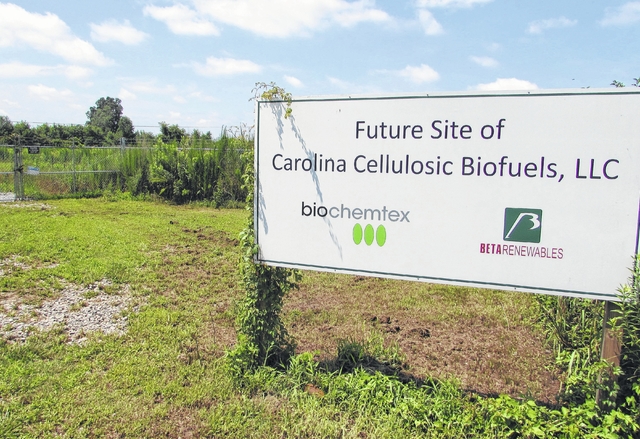The site for the Carolina Cellulosic Biofuels project, commonly known as Chemtex, is overgrown from inactivity — but the $220 million project set for Turkey Highway is alive and well.
“The project continues to go well and it continues to be busy,” John Swope, executive director of the Sampson County Economic Development Commission, said during the first of two required public hearings for the county to receive funds through the Small Cities Community Development Block Grant Program (CDBG).
Chemtex is expected to go through its financial closing in the fourth of quarter of this year and begin construction at the 40-acre Clinton Industrial Rail Park site in January 2017.
“This is taking longer than expected for several very logical reasons, notably due to it being new technology,” Swope said, noting the amount of paperwork lending institutions and others mandate, while also stating that the project has been extended additional tax credits as a renewable energy facility. “They’re behind schedule by a significant amount of time, but it is going well.”
The CDBG program permits grant funds to be used toward infrastructure projects that address health and safety needs such as water and sewer projects or support economic development endeavors. Applications for economic development must show that in excess of 60 percent of CDBG funds will benefit low or moderate-income persons through job creation or retention.
The Sampson Board of Commissioners held previous hearings regarding such grant funds and authorized submission of a grant, but because of delays in the project’s start-up, the application was not submitted. Since it has been more than 12 months since the original public hearing, the hearing process had to be revisited.
“We already sought and obtained those funds, but it’s taken so long we are required to go through this process again,” Swope noted.
Swope said that $4.7 million in grant funding for N.C. 24 improvements, as well as water, sewer and rail infrastructure, have been received to date. Those grant funds consist of $1.76 million from the U.S. Economic Development Administration, awarded to the City of Clinton in June 2014, to construct water and sewer infrastructure to support Chemtex. Along with that federal source, roughly $3 million in grants were received from six different state sources, including the N.C. Department of Transportation, N.C. Department of Commerce and Golden Leaf Foundation.
Along with water, sewer and rail infrastructure, N.C. 24 (Turkey Highway) will be expanded to three lanes extending to the east end of the site.
The project has a taxable investment of about $151 million, but Swope said that could climb to $170 million. The plant will bring 65 jobs to the area, a commitment made by Chemtex to receive grant-back incentives. It now has 100 percent of the feedstock needed to accommodate the plant.
The refinery will make ethanol from plants other than corn, producing 20 million gallons per year of cellulosic biofuel from locally-grown energy grasses, agricultural residues and woody biomass. The plant would be the first commercial-scale, advanced biorefinery in the United States.
Swope called the financial part of the $220 million project like “a home closing on steroids.”
“They’re finishing up all those details,” Swope stated.
Should everything go as anticipated, the 22-month construction timeline would place the plant opening at the end of 2019. The 65 employees would be hired during that time.
“Nobody thought it would take this long. I’m looking forward to this getting started,” Swope said. “It’s exciting.”

